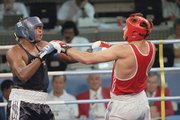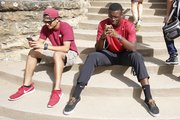FAYETTEVILLE — It began with a gunshot. A blank fired from the starter’s pistol triggered the clock and began the 2016 Texas Relays 400-meter hurdle final.
Then 21 steps.
Twenty-one steps from the starting blocks to the first of 10 36-inch high hurdles. The remaining 350 meters and nine hurdles went by in a similar fashion, with each explosion over a hurdle slowing the runners as their bodies tired.
The clock paused on the screen above the first turn on the track. The winner’s time of 50.91 seconds popped up, a confirmation that some of the NCAA’s best sprinters just performed. For Arkansas' Larry Donald, it was a monumental performance, but it was hardly the biggest challenge of his life.
While those seven competitors were tough to conquer, that race was nothing for Donald. The son of an Olympic heavyweight boxer of the same name, Donald barely made it to college and nearly had to end his collegiate career in the spring of 2015.
A lack of talent didn’t create these problems. Instead, a lack of money did.
Growing Up
In 2012, when Donald entered his senior year of high school he lived in a five-bedroom, two-bathroom home with hardwood floors and carpeted bedrooms in Jacksonville, Fla. There was just one catch: For that entire school year, until his final month of high school, Donald lived alone with his younger sister in a home that was foreclosed.
Donald’s family was caught in the middle as the owners of the home - whom Donald’s mother paid rent to - stopped paying the mortgage, forcing the bank to begin the foreclosure process.
“It was going into foreclosure but the bank didn’t kick us out or anything,” Donald said. “They kept putting notices on the door but the cops told us that they (the bank) can’t kick us out because it’s not our fault. The banks had to work with us.”
The bathrooms were faulty, the air conditioning was broken and there was no internet access in the home. On top of that, Donald’s mother had moved to Miami for a better job to make more money for her kids.
His parents were divorced and his father lived 800 miles away in Cincinnati.
“In high school I never really hung out with anybody outside of school,” Donald said. “I didn’t go out because it was just me and my sister. I’d go to school, go to track or football practice, come home and make sure that me and my sister had something to eat, do my homework and then go to bed.”
As a senior in high school Donald became an adult. He cared for himself and his sister, all while improving his times on the track so that he could run in college.
Tough Breaks
Born in Cincinnati and raised in Jacksonville, Donald’s life has been marred by poverty and bad fortune. The summer before he went to college Donald had to rearrange his life’s plan in a month.
“When I was graduating from high school I was talking to the Florida coaches and the head coach was in Germany for vacation,” Donald said. “So I was talking to the hurdle coach the whole time and he had seen me run and he liked me. He saw my potential, that I was hard working and that I didn’t give up so he wanted me and offered me around 20-30 percent (scholarship aid).”
Sadly, when the Florida coach returned from vacation he told Donald via email a month before classes started that the program would not be extending a scholarship.
Donald’s high school coach then reached out the several college. Among those that responded was Arkansas.
“Arkansas told me I could walk-on and if I scored points at SECs or nationals they’d give me some money,” Donald said.
Donald decided to be a Razorback.
Out of Money
As a freshman in 2014, Donald scored for the Razorbacks at the SEC Outdoor Championships by finishing sixth in the 400-meter hurdles. Still, no scholarship came.
This was particularly bad for Donald who, despite receiving money from federal student aid program FAFSA, was still struggling to find the money to afford his education.
“Freshman year my mom didn’t pay any of it and to keep me in school my dad and uncle paid a total of $3,000,” Donald said.
However, as his tuition bills mounted he was unable to enroll for the spring of 2015 and had to take a redshirt season.
“I tried to pick up loans,” Donald said. “I went to almost every bank around here to try and get a loan but I had nothing to put the loan against so they all said no.”
Donald had to pay off his balance of nearly $15,000 before he would be allowed to enroll and compete for the Razorbacks again. Arkansas Coach Chris Bucknam spoke with Donald about the matter and those words still reside with the hurdler.
“When I knew I wasn’t going to be able to pay it off the words that stuck out to me the most were from Coach Bucknam," Donald said. "He told me that if I can’t pay then I’m going to have to go home. In my head I was like, ‘I’m not gonna go home.’ I felt like doing that would be me quitting.”
While revenue sports like football and basketball give out full rides, men's NCAA track programs only are allowed 12.6 scholarships to divide among entire teams. It’s common for Olympians, All-Americans and conference champions to only be given partial scholarships.
Out of money, Donald was unable to enroll for the semester.
“We supported Larry in every way we could and encouraged him to continue to pursue his education,” assistant track coach Doug Case said in an email. “Our number one goal is to win but I feel like our staff is focused on winning on and off the track. We don’t abandon anyone that is willing to help themselves and Larry is definitely a motivated individual.”
Time for Work
Despite Donald’s lack of outside help at the time, he quickly found a full-time job during his semester off from school.
“My first job was Walmart and I worked the 4 p.m. to 1 a.m. shift," Donald said. "That’s the one where they unload the trucks so I’d work in the back."
Working 40 hours a week, earning $7.80 an hour wasn’t going to pay off his debt and his unusual work hours allowed for little social interaction. However, Donald’s best friend and former roommate, Stephen Payne said that's when he learned the most about Donald’s character.
“One thing about Larry Donald is that he is always sure about everything,” Payne said. “There was never a doubt in his mind that he was going to make that money and get back in school. He always stayed positive.”
Donald’s time at Walmart lasted from late January to early March 2015 when he then began working as a server at the seafood restaurant Juicy Tails. His time at Juicy Tails during the summer of 2015 is what allowed him to start making payments on his university balance and work his way back to competing for the Razorbacks.
After eight months away from school to make money, Donald re-enrolled at the University of Arkansas in the fall of 2015. Donald’s tardiness hadn’t dampened his zeal for what’s to come.
Because he rejoined the team during a fall semester, Donald was able begin working out just before the team began its fall conditioning. He was able to compete again in 2016 as a redshirt sophomore.
Now as a redshirt junior Donald is on a partial scholarship from the UA track team and the 21-year-old will compete this weekend in the 60 hurdles at the SEC Indoor Championships in Nashville, Tenn.
He'll need to improve his time of 7.84 seconds in the event to qualify for the NCAA indoor meet next month. He's more likely to qualify for the 400 hurdles at the NCAA outdoor meet in June.
“I want to win (NCAA outdoor nationals),” Donald said. “I mean, everyone wants to win."
Given the obstacles he already hurdled, Donald already has won.
Gabriel Lodge is a journalism major at the University of Arkansas. You can email him gnlodge@uark.edu.



